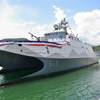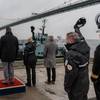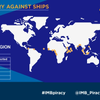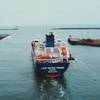Austal USA Christens Latest Navy Ship
American, Australian-Domiciled global ship building company Austal Limited said that its latest USA-made Navy vessel was officially christened during a ceremony Saturday at the company’s shipyard in Mobile, Alabama.
The future USNS Newport, the Navy’s 12th Expeditionary Fast Transport (EPF) vessel, was honored during a ceremony featuring the traditional breaking of a champagne bottle on the side of the ship by its sponsor, Charlotte Marshall of Newport, R.I.
Newport is the twelfth of fourteen EPF’s that Austal has under contract with the U.S. Navy, 10 of which have been delivered with the remaining 4 in various stages of construction.
Austal Limited Chief Executive Officer David Singleton said the Expeditionary Fast Transport is a successful, mature naval vessel program, adding great capability and support to U.S. Navy operations around the world.
“Austal USA is doing an outstanding job, constructing these highly-versatile vessels efficiently and consistently, to the highest standards. We couldn’t be prouder of the fact that of the 10 EPFs delivered in just over 10 years, seven are currently deployed to US Navy operations around the world, demonstrating the broad application and effectiveness of the platform,” he said.
The future USNS Newport was officially christened by ship sponsor, Charlotte Marshall and was named after Newport, Rhode Island - home to U.S. Naval Station Newport and the Naval War College.
The 103 meter EPF is capable of transporting 312 embarked troops and 600 short tons of cargo up to 1,200 nautical miles at an average speed of 35 knots. The ships can operate in shallow-draft ports and waterways, interface with roll-on/roll-off discharge facilities, and on/off-load a combat-loaded Abrams Main Battle Tank (M1A2).
The EPF includes a flight deck for helicopter operations and an off-load ramp that allows vehicles to quickly drive off the ship. The ramp is suitable for the types of austere piers and quay walls common in developing countries. EPF’s shallow draft further enhances littoral operations and port access. This makes the EPF an extremely flexible asset for support of a wide range of military and other (humanitarian and disaster relief) operations to small or damaged ports.













